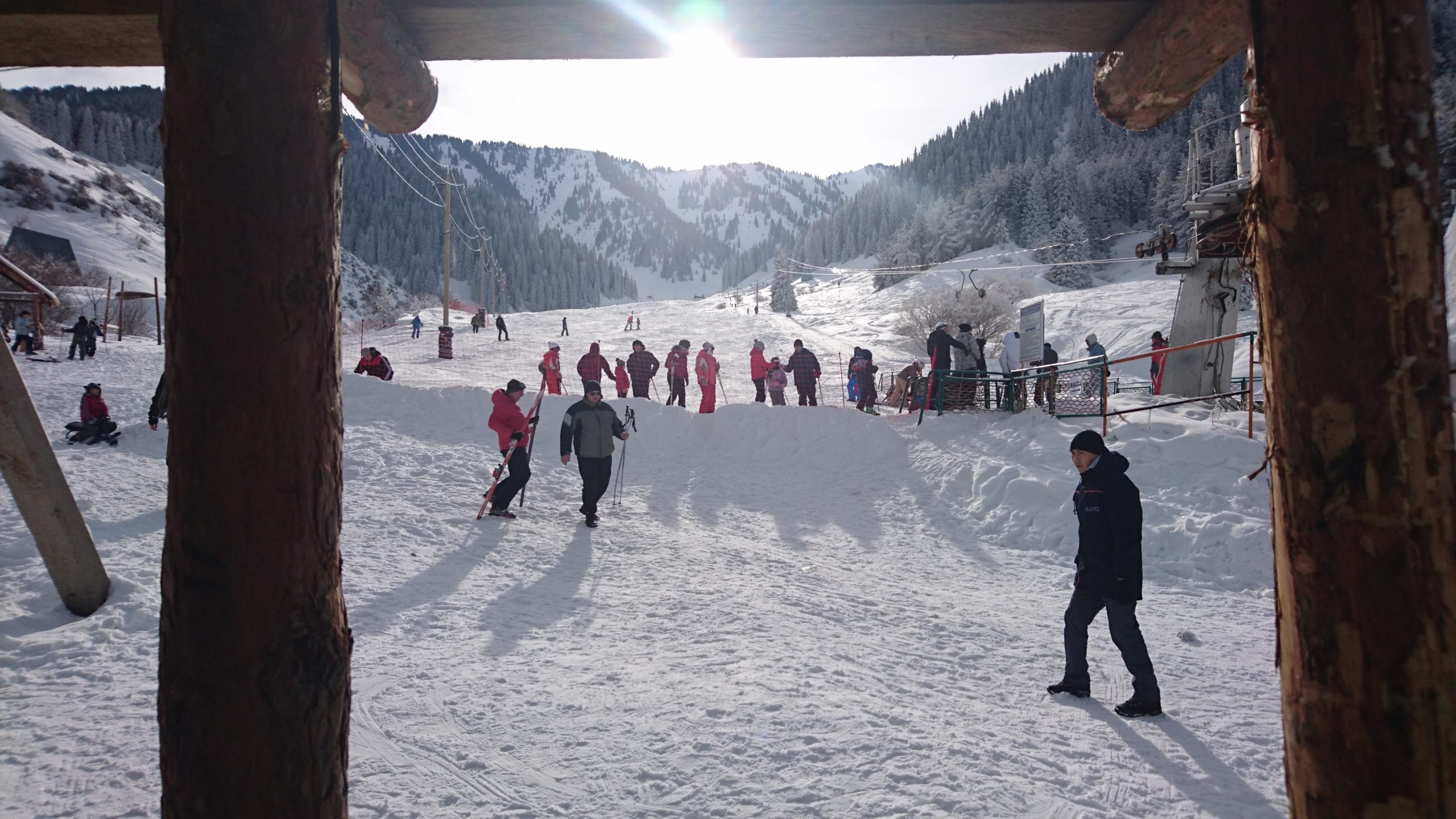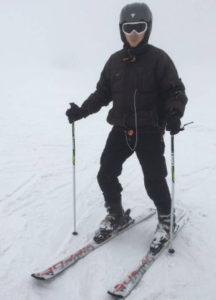This is not an article directly related to Autistan or the Autistan Diplomatic Organization, but the experience described here (lived by the Founder of that organization) is a “piece of the puzzle” that has been important in the preliminary experiences and reflections (in February 2016) which led to going much further during the summer that followed, during a second stay in Kazakhstan (as you can see in the other articles).
It also made it possible to do “more than just words”, and to show a “capacity to do things”, and not just to explain.

My stay at the Pioneer ski resort in February 2016 was a very interesting and useful experience.
Thanks to the human atmosphere there, I felt in confidence and I accepted their kind proposal to try to take ski lessons, which looked almost impossible for me until then.
Anyway, since I had explained, privately to Zhanat Karatay (the Director and owner of this ski resort, and mother of autistic children) and – later – in the “Almaty Autism Speech“, that the main key, for autistic people, is the verb “to try”, I was obliged to put into practice the theories that I exposed 🙂
And it worked, of course.
While skiing, I discovered the limitations of the control of my mind over my body.
Usually, the relationships between my mind and the concrete reality are not so difficult, but when you are gliding on skis, things go very fast and you really have to be very focused on every new “surprise” from the snow (the earth, the reality) and to react in fractions of seconds, which is very difficult for an autistic person, given that, basically, we do not live fully in our body (but more in the “thoughts”), and we have a special relation with space and time.
In other words, I had to force myself a bit.
And no one likes to force themselves, that’s true, but for many autistic people it is often a completely impossible thing to do, especially when they don’t understand the reason or the “justification” (another extremely important notion in autism: justification).
This is why, as many parents and educators know, it is very, very difficult to “force” an autistic person to do something (and of course, the trick is to make them want to do it).
So here, when autistic children (or adults) come to this mountain resort, and try skiing for the first time, it is probably not because they are passionate about this sport, but rather because their family is (quite rightly) trying to make them experience something new.
So when they start skiing (with the help of an instructor holding their arm, as I was for me), they are usually not very motivated, especially at the beginning, so they have to “force” themselves.
And from the very first seconds, they understand that this “obligation” is not only a theory…
You simply have no other choice: you manage to control your body, or else you fall, it’s simple, very easy to understand.
So, “by the force of things” and by the force of Nature (which is certainly more “acceptable” than debatable social obligations), this experience teaches us to do things we don’t necessarily want to do, it gets us used to forcing ourselves, and also it allows us to instantly understand the justification of these “obligations” (of body control), because if we don’t do what is “right”, we fall.
So it’s a very concrete demonstration. Autistic people need concrete things. Here, it is much more concrete and effective (immediate) than “threats” such as “if you eat too much, you’ll get fat”, or “you have to study at school to have a good situation later”, which is extremely abstract and uncertain.
So this skiing experience teaches you to force yourself to do things you don’t necessarily want to do, it teaches you to go beyond your own limits (sometimes you think you have certain limits, but they only exist because you believe they do.).
So, I had to make unusual attention efforts, in order to manage to control the situation and not to fall.
I could feel that when it was going too fast, I was starting to panic a little bit, and to lose control, and to be close to falling.
Here, I mean that the cause of the fall would not be the speed or other terrain related problems, but a decrease in the control of the body by the mind, due to the state of panic due to the fear of fall. In other words, the fear of falling … causes the fall …
And this is probably an interesting point about psychological mechanisms.
The Pioneer staff is aware about autism and they were patient and attentive, and it made a real difference for me, and that gave me some courage.
Finally, after a few hours, I could even ride the whole slope (more than 1 km long), with the help of an instructor.
On top of that, it was a real exchange, because they were already aware of autism, that’ s true, but also I had the opportunity to answer their questions in a very detailed way, about the reticence and difficulties of the autistic children they usually welcome and train. This allowed them to have a more adapted approach, autism became less “mysterious” for them.
In other words, they “taught me to ski” (in a basic way), and I “taught them to ski with autistic people” (or to increase their skills in this domain).
This experience helped me to understand better my own autistic characteristics, to improve my self-confidence and the control of my body.
Indeed, the improvement of self-confidence is another very important benefit of this experience.
In general, autistic people have a very low self-esteem.
And they have very few opportunities to improve this, because they should be able to experience many new “physical” things, and they should be able to create things (for example with their hands).
But unfortunately, very often, their “social environment” (mostly, the family) does not give them this kind of opportunity, and “locks them up” in a kind of “super-protection”, which is the opposite of what should be done.
Indeed, how can one want “improvements”, i.e. changes, if one does everything to “protect” the autistic person from changes?
In life, you have to take some risks.
And here again, this skiing experience helps us, it accustoms us to controlled risks, to “acceptable falls”. This is really important.
If you fall, you realise that the world has not collapsed. You may be in a bit of pain: and so what?
We should not be afraid to make mistakes, we should not refuse new experiences for “fear of making a mistake”, “fear of falling” (as long as it is not really dangerous).
“Comfortabilism” (as I mentioned in the “Almaty Autism Speech“) and the “fear of everything” are traps, really toxic traps.
Now regarding the notion of “self-esteem”, the social system is completely wrong because it teaches people (including autistics) that self-esteem is obtained through “social recognition”, i.e. judgement of oneself by others (usually strangers, who understand nothing about us).
This is particularly absurd, but it’s what everyone does, and when an autistic person starts to learn this, it’s really dangerous, and sometimes ends in suicide (this is beyond the scope of this article, but I could explain…).
In short, when we glide on skis on the snow, things are not so abstract and complicated: if we manage to glide without falling, we know we are in control of our body, and therefore our self-confidence is improved, no matter what other people think: it is a question of direct relationship between us and the laws of Nature, without the intervention of the “social factor”, which is so problematic for autistic people (and for everybody else…).
I think that when an autistic person can manage to have such control in such difficult (fast) conditions, then they can have a good control in many (or all) other situations.
And I think that it is easier to learn for children, because they are still very open to “changes” and learning. I mean that they don’t think too much about their “limitations” (and even less about the “social judgement”, for example the notion of “shame” if they have many difficulties): like with the famous quote of Mark Twain, “They did not know it was impossible so they did it.”
So, among the many benefits of this experience, it helps to improve the self-confidence, which is something very important and necessary for the autistics.
Finally, in my opinion, for us autistic people, in these skiing experiences, the most important thing is not really the skiing or the “sporty” side: skiing is mostly a tool that allows us to experience the natural reality, the laws of Nature and of our body, in a very strong, true, and immediately understandable way.
That’s why this kind of experiences (but also other ones, like cycling for example), are very useful things because we need harmony and a “natural link” with what surrounds us (and that link is often lost, broken, perverted, distorted or complicated by the “social system”).
And of course it is very useful for learning to control one’s body better, to be more attentive, to force oneself, to be less afraid of everything.
And for learning to take risks, and for increasing one’s self-confidence.
All these things are very important, and Nature (snow and the laws of gravity) allow us to learn this very simply and quickly, to reconnect and synchronise ourselves with mother Earth, which is obviously beneficial, and probably something that is missing more and more.
Additionally, I found that the owner of the Pioneer Mountain Resort (Zhanat Karatay) is very involved in the help of autistics, and she is also friendly and kind ; that’s why I hope that she will succeed in collaborating to the autistics autonomy and “a better life for the autistic people”, thanks to this “tool” (the adapted ski sessions), among other means and methods.

